IHMC’s Cmap software is being used by thousands of people around the globe to build and share concept maps. Below are some of the testimonies and experiences from individuals, schools and institutions using CmapTools.
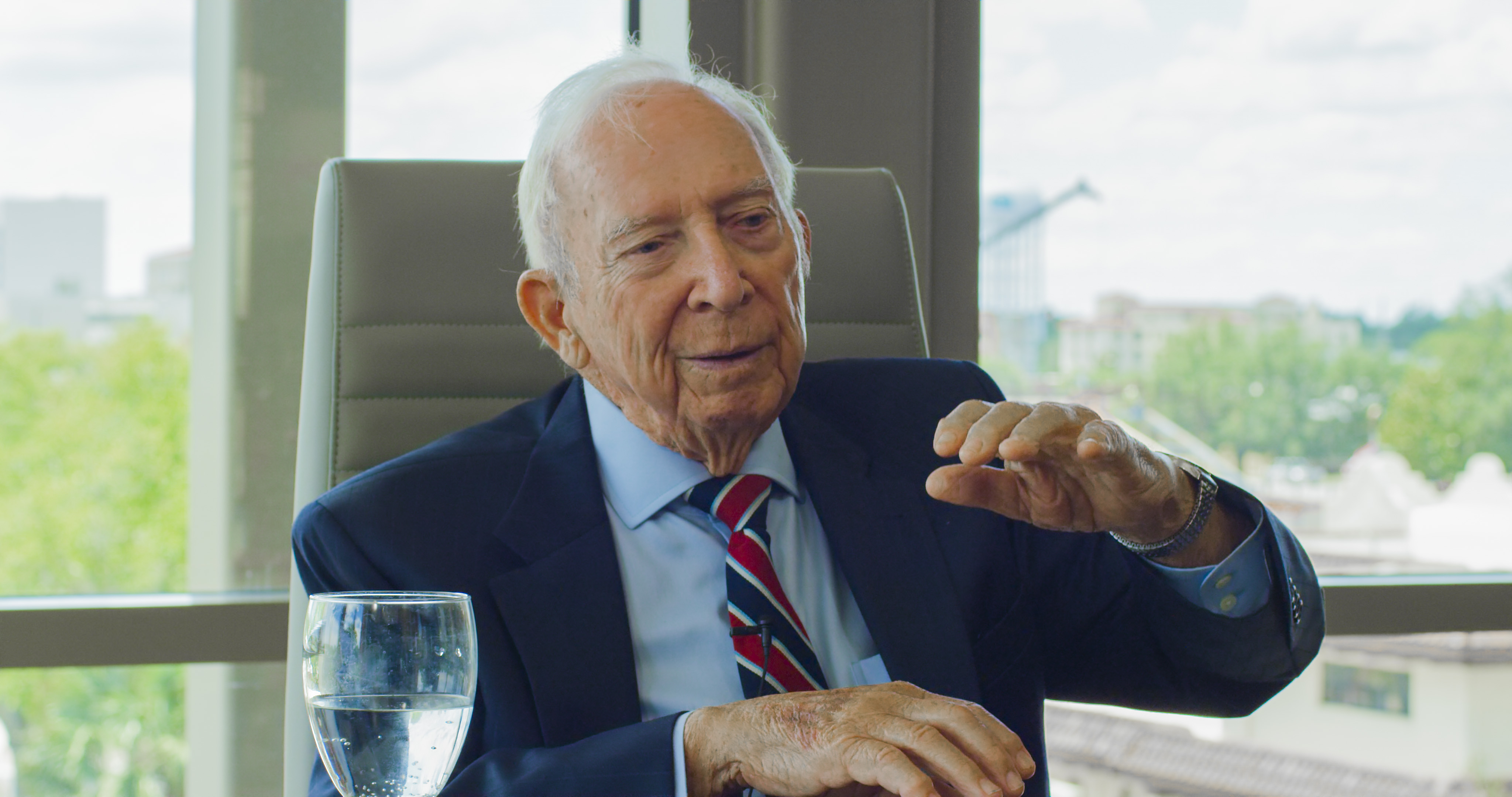
Joe Novak, who with his research group invented concept mapping while at Cornell University, has written his autobiography “A Search to Create a Science of Education: The Life of an Ivy League Professor, Business Consultant, and Research Scientist” which is available for free at in pdf and epub formats. We’ve complemented it with 2 video presentations by Joe on his life’s efforts.
Enjoy learning about Joe’s life story, both in his autobiography and his video presentation, at:
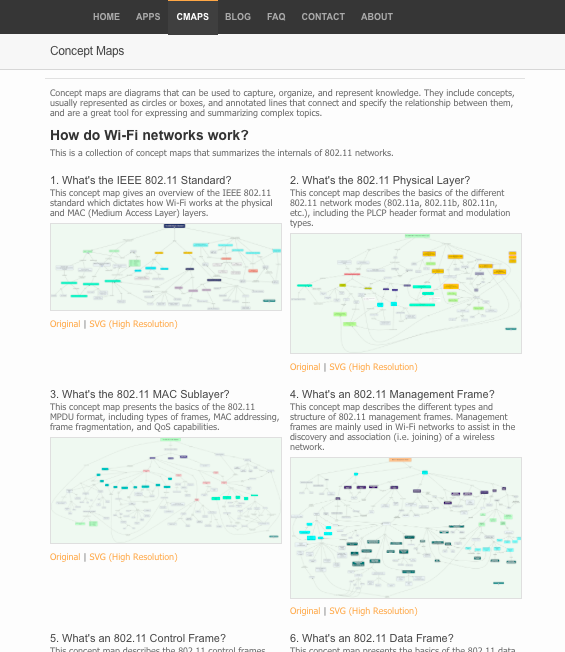
Wi-Fi Explorer App’s website explains “How do Wi-Fi networks work?” using Concept Maps
Adrián Granados, a key member of the CmapTools development team that left for Florida Institute of Technology (FIT) a few years ago, developed and published a set of tools to deal with Wi-Fi, including the popular “WiFi Explorer” App which allows you to scan, monitor, and troubleshoot wireless networks. (It’s a great App, highly recommended.) To explain “How do Wi-Fi networks work?”, Adrián uses concept maps in his website.
Concept maps to explain complex ideas… why don’t we see more of them?
Check out the concept maps at:
https://www.adriangranados.com/learn
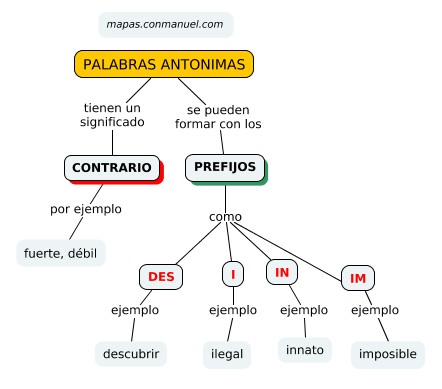
Concept Mapping workshops for elementary school students and adults in Murcia, Spain
Manuel Pérez, from Murcia, Spain, offers workshops on concept mapping for students — particularly for younger students around age 10 (5th grade) — in which students analyze a text, summarize it, and then proceed to construct a concept map by hand and then using CmapTools. Yes, the workshops are not free (30 euros), but they are not associated with a school. Groups are composed of up to 4 students per workshop. Workshops are also available for adults.
Concept mapping workshops independent of school work…. nice idea!
More information at: http://conmanuel.com/crea-tu-mapa-conceptual/
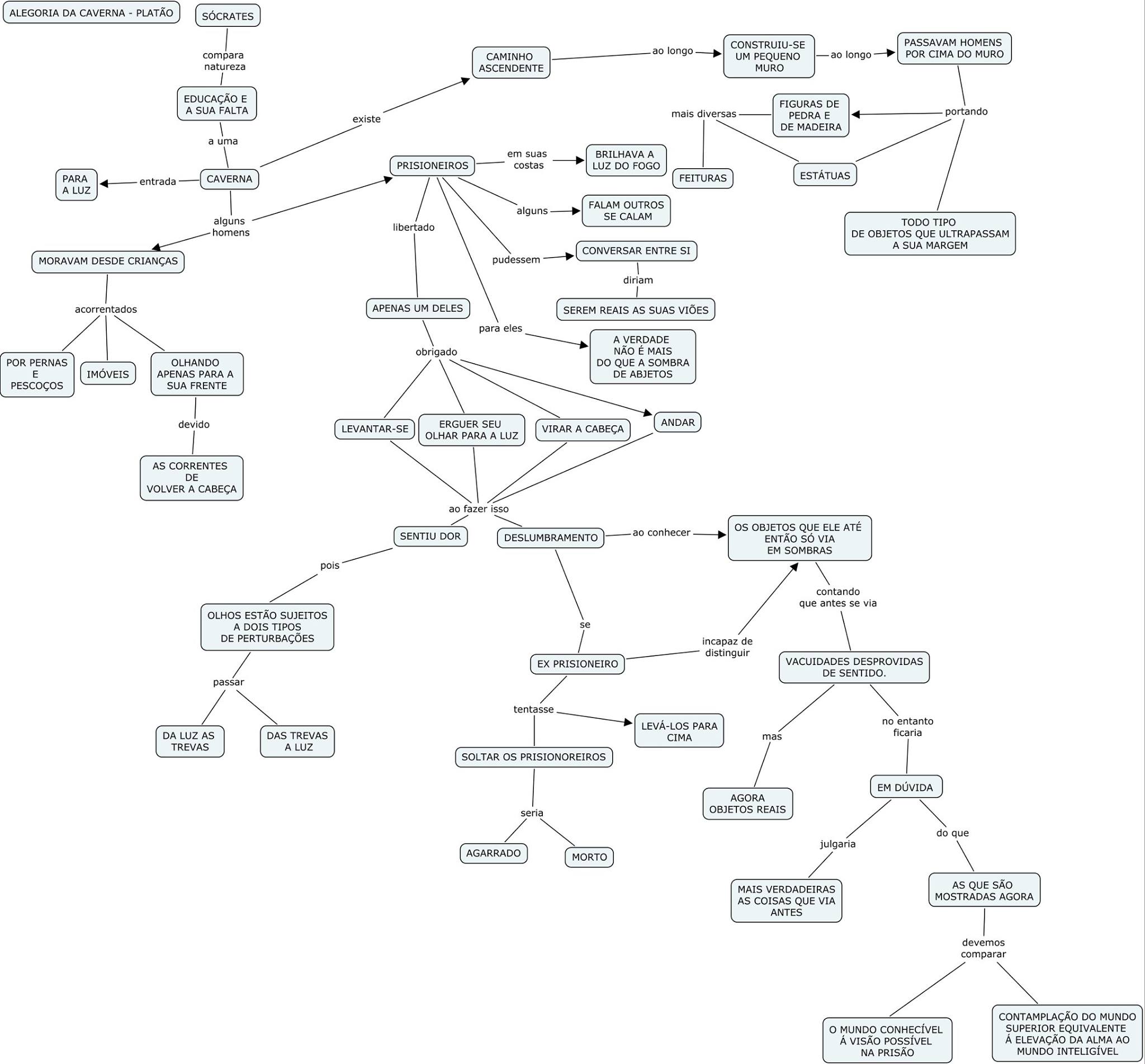
Cmaps in High School Philosophy at Colégio Estadual Benedicto João Cordeiro, Curitiba, Brasil
Claudio Roberto Molina Sanches, a Philosophy Professor and participant in the PDE/2014-15 (SEED-PR) program, uses a Facebook page to share the results of an experience with concept maps at Colégio Estadual Benedicto João Cordeiro, a High School in Curitiba, Paraná, Brazil. The students of the first two years of high school read classical philosophy text, constructed Cmaps using CmapTools in the Linux computer lab at the school, and made presentations of the Cmaps they constructed.
For more information, see the Facebook page:

Universidade de São Paulo (USP), Brasil: Research Group on Concept Mapping
The “Grupo de Pesquisa Mapas Conceituais” at the Universidade de São Paulo, Brasil, lead by Prof. Paulo Correia, focuses on understanding how concept maps can foster meaningful learning and collaborative processes. They are investigating Cognitive Load Theory as a means to better understand critical aspects that need to be overcome implementation obstacles found when Cmaps are used in everyday classrooms. Ongoing projects focus on Cmaps made by students and teachers.
- Cmaps made by students: Most students are novices at both concept mapping and on the taught subject. The research group has developed training activities to help students produce good Cmaps, i.e., representative external representation of their internal mental models. Student-centered activities involving Cmaps can easily place students under cognitive overload.
- Cmaps made by teachers: Being experts on the taught subject, teachers need to gain experience on concept mapping. They can prepare expert Cmaps to be used in classroom before the instruction (e.g., advance organizers), during the instruction (e.g., to set up learning activities) and after the instruction (e.g., to evaluate students’ conceptual understanding). The research group is investigating which are the most suitable structural and semantic features of these Cmaps to foster cognitive processes related to learning.
For more information, visit: http://www.mapasconceituais.com.br
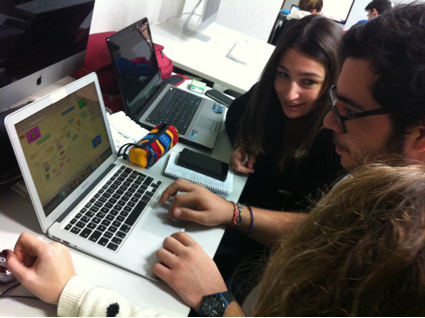
Universitat de les Illes Balears: Use of Concept Maps as Learning Folders
As a research project within the Innovative Teaching Project “Student-Centered Learning and Assessment Strategies using Technology as a Bridge for the Transfer of Knowledge and to Connect Formal and Informal Learning” being carried out at the Universitat de les Illes Balears in Mallorca, Spain, the ‘Grupo de Tecnología Educativa’ (Educational Technology Group) led by Prof. Jesús Salinas, proposes the Learning Folder as a tool to promote the creation and dissemination of knowledge and for learning assessment. The objective of the project is to develop and evaluate learning strategies based on the personal learning environment and the personal learning network beginning with the creation of contents, collaboration, and information management. To evaluate the use of concept maps for the development of the Learning Folder, undergraduate elementary-education students from the third course (Technological and Media Resources in the Teaching-Learning Process in Elementary School), working in groups, will choose the tool to use for the development of the Learning Folder from a set that includes CmapTools. To evaluate the use of concept maps as a Learning Folder, followup will take place at the beginning, middle, and end of the course, which will include an analysis of the concept maps and their contents, and students are asked to respond to an evaluation survey.
For more information, visit: http://gte.uib.es/pape/gte/
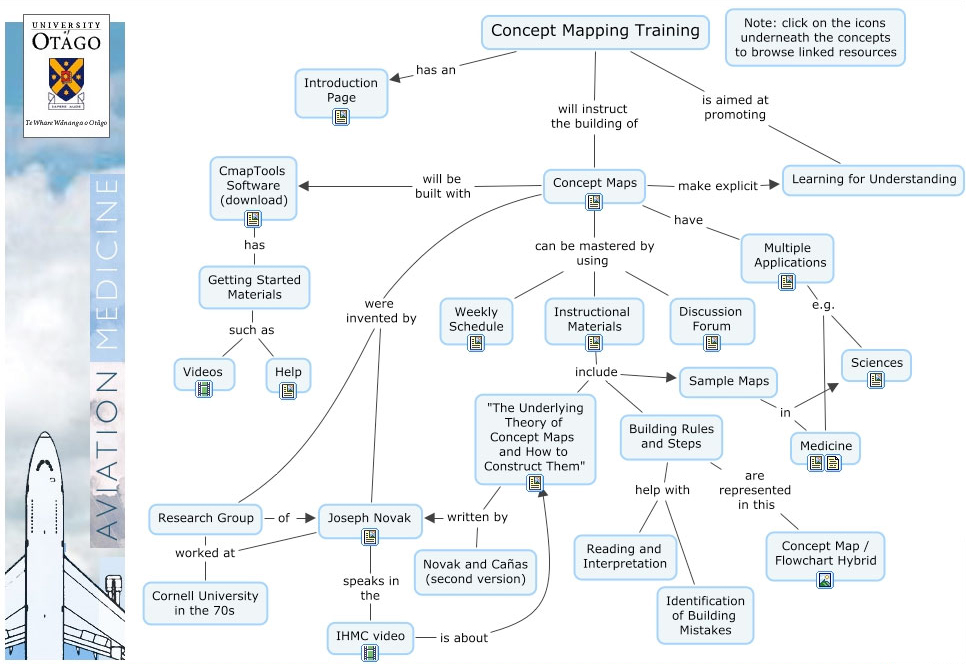
University of Otago, New Zealand, Concept Mapping Training for Aviation Medicine Masters Students
At the University of Otago, New Zealand, Gloria Gómez and Rob Griffiths created a distance learning concept mapping course for Aviation Medicine master’s students. The project, funded through an Otago University E-learning Enhancement Grant, included:
- Design and delivery of an online concept mapping training to instruct Aviation Medicine masters students
- Literature review on medical education and concept mapping and automated assessment of concept maps
- Task analysis of the process of evaluating concept maps online
An evaluation was done of the instruction design, synchronous and asynchronous communication tools, the students’ learning interactions with concept mapping, analysis of interactions of the interactions with his students, and the evaluation process of the lecturer.
For more information, visit: http://www.gloriagomez.com/aviation.htm
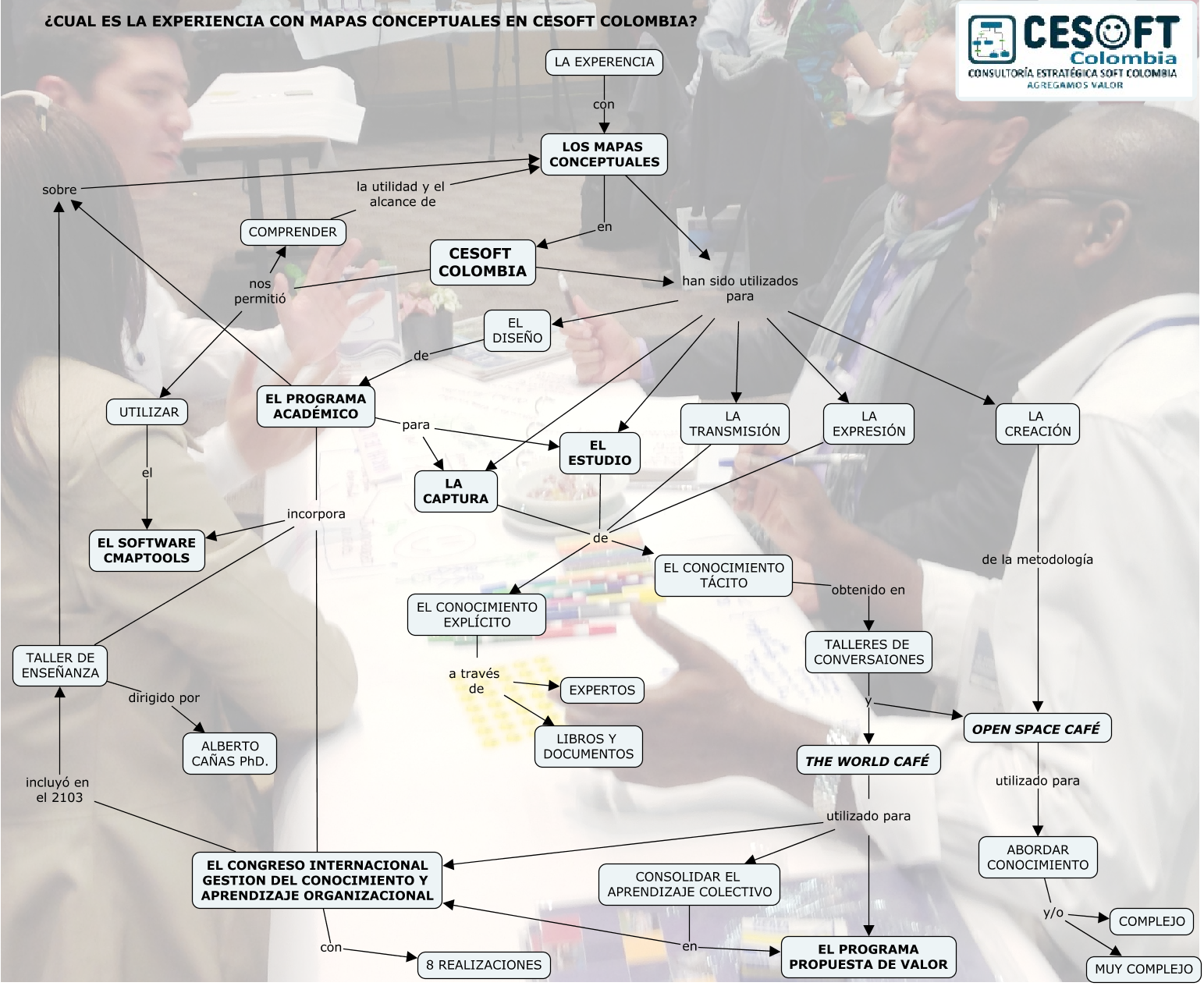
Experience with Concept Maps at CESOFT Colombia
At CESOFT Colombia we got initiated with concept maps and CmapTools through our participation at the 2nd International Concept Mapping Conference in San José, Costa Rica in 2006, where we comprehended the utility and reach of this methodology, as well as the benefits of the software tool. Since then we have applied them in our work; we began with the organization and hosting of the 1st International Conference on Knowledge Management and Organizational Learning in 2008, where we offered several talks on the use of the tools in Knowledge Management.
In the second edition of the conference we used the tools for the collective knowledge capture of conversations in the World Café, replacing the original graphic registry used in this methodology. We found concept mapping and CmapTools to be more efficient because of the speed with which collective knowledge could be captured and, in particular, for its dynamics that allowed the documentation of previous knowledge collaboratively.
Since then we have intensified the use of concept maps and CmapTools to capture knowledge in conversations workshops.
In 2014 we integrated The World Café and Open Space Technology methodologies to cover more complex topics, with the collective knowledge capture done using concept maps. The success of the experience has take us to the creation of Open Space Café, a powerful social technology, helpful in the processes of Strategic Planning, Knowledge Management, Communities of Practice, Marketing, Organizational Development, Disruptive Changes, Resilience, Community Development (Municipalities), Peace, Coexistence, and many other topics that integrate multiple disciplines.
For more information visit http://cesoftco.net/Cmaps.php
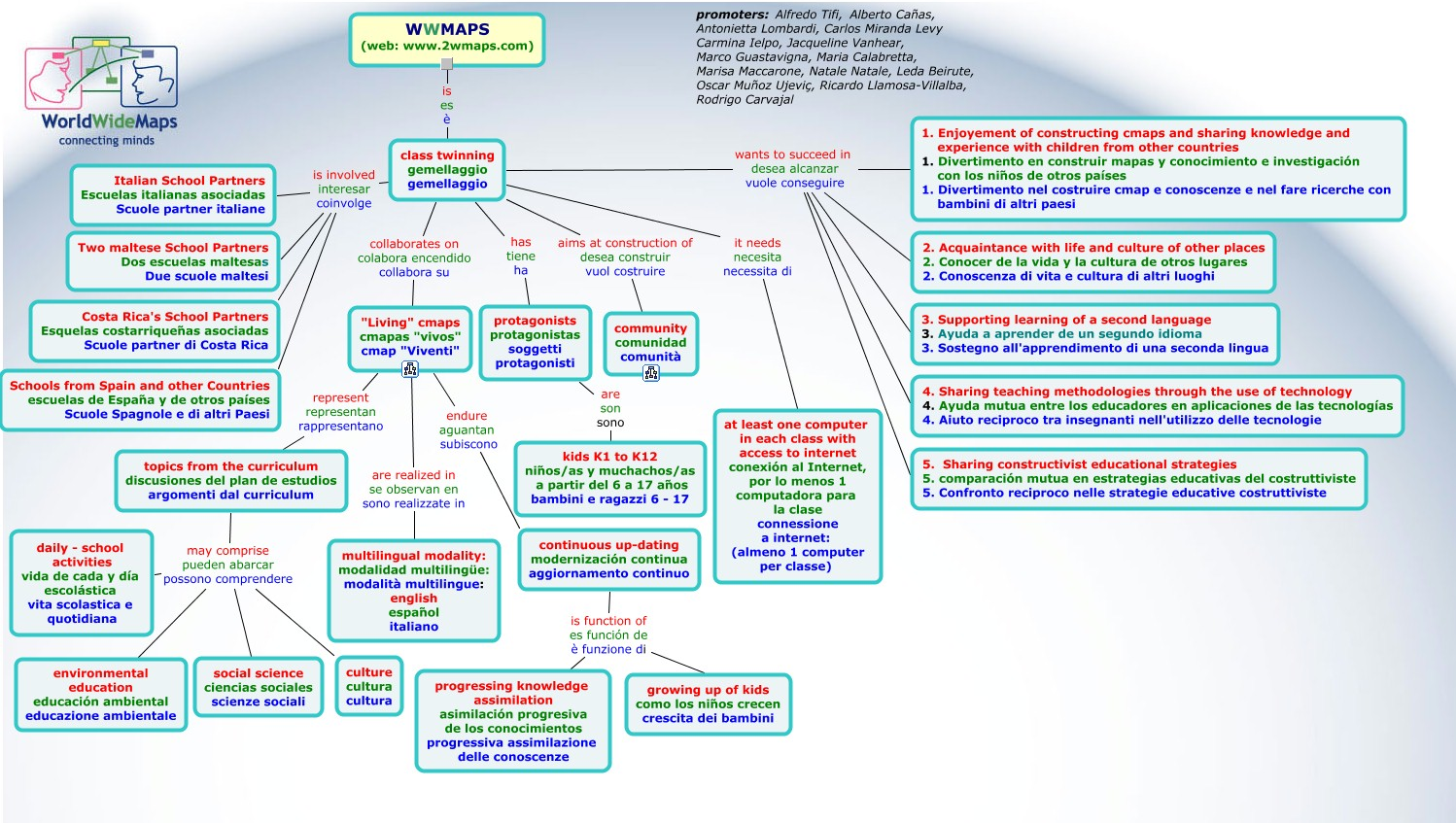
WWMaps: Collaborative Concept Mapping by Students from Different Countries
The WWMAPS project was active around 2004-2008 to allow children from different countries world-wide to construct concept maps collaboratively. it was led by Alfredo Tifi and Antonietta Lombardi.
It was an amusing and interactive way to develop learning and to construct new concepts, starting from experiences, content and prior knowledge of the children. Concept maps (Cmaps) offered a swift, synthetic and accurate way to construct meaningful propositions and to follow the development of the new knowledge. CmapTools technology enabled children to work collaboratively and learn the partner’s language. Diversity of language didn’t pose a serious problem, because mono-lingual Cmaps were easily translated in multilingual Cmaps without changing the structure and with the maximum of interaction and communication with minimum number of words.
In a few cases (with Panamá, Egypt and the UK) it was also possible to create overseas Cmaps in synchronous collaboration, through Skype video-conference or chat. All the collaboration tools of CmapTools were exploited, and students of every age introduced lot of resources, images, texts, audio-visual, Web pages, etc., about own life experiences, culture or content subjects.
For more information: www.2wmaps.com. All the projects’ process development and products can be seen at the link http://goo.gl/AhK8wp.
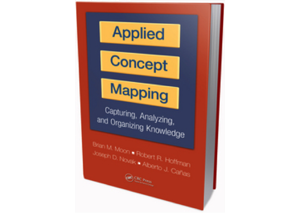
Applied Concept Mapping
Published in 2011, Applied Concept Mapping: Capturing, Analyzing and Organizing Knowledge (CRC Press) details the work of dozens of practitioners from around the world who have put concept mapping to use in applied settings.
Available at Amazon
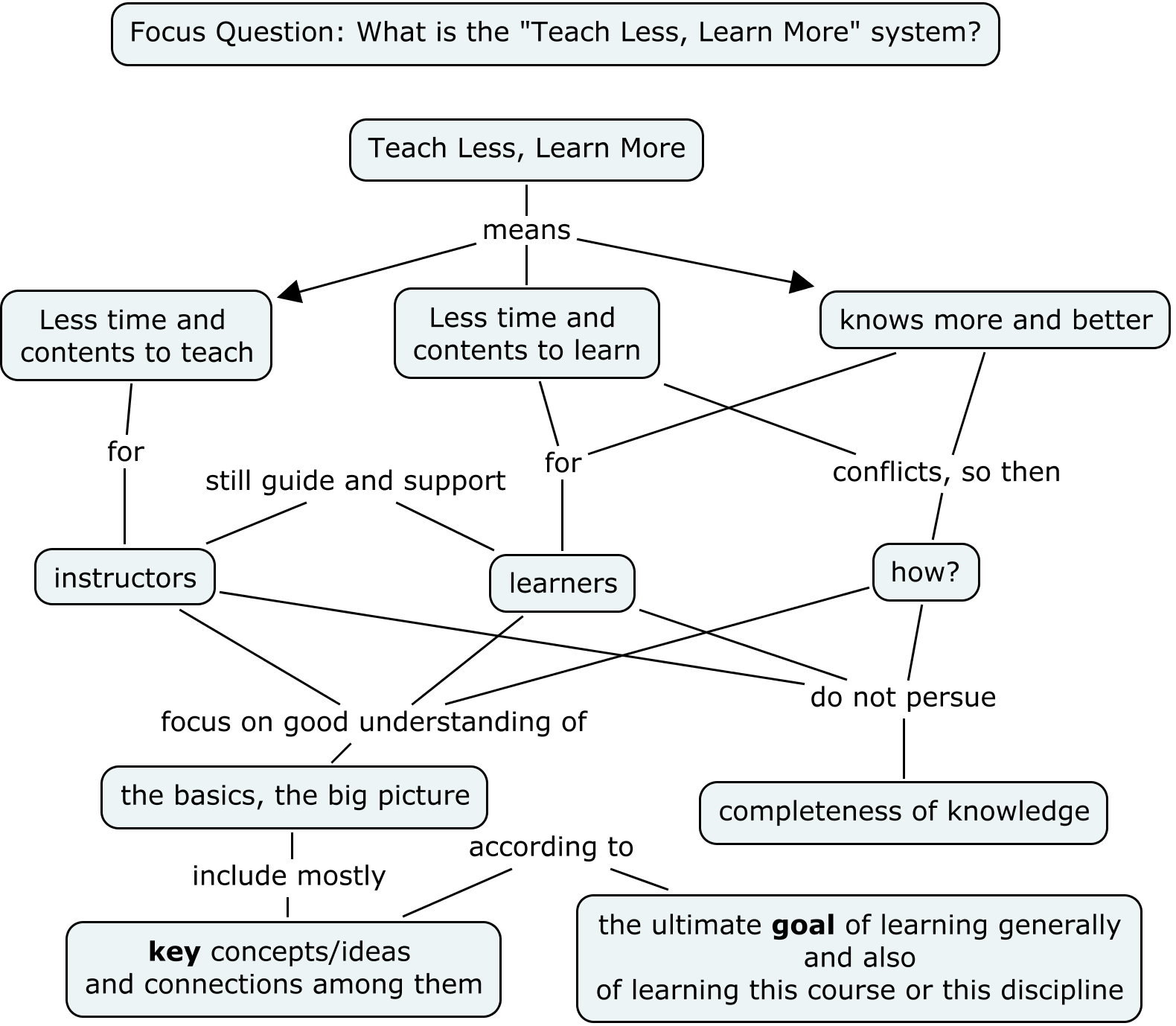
Teach Less, Learn More: Concept Mapping and Meaningful Learning at Beijing Normal University in China
Jinshan Wu, a physicist and an educator at Beijing Normal University (BNU) and his colleagues at BNU, together with educators all over the world, are running a series of workshops and mini courses to provide skill training to faculty members and students at and beyond BNU. More importantly, besides improving concept mapping skills of participants, the program is designed to help the participants think in a more organized fashion and think about what to teach/learn. The goal is that once people knows how to think more efficiently and more deeply, and also knows better what to teach/learn, they can teach/learn better with less amount of time. Teaching/Learning should be more concentrated on basics, such as fundamental concepts and the main logic framework, instead of all the glory details. In this way, teachers can teach less and at the same time students can learn more while study less.
The BNU team also working on demonstrative courses which integrate concept mapping closely with subject matters following the principle of learning only the basics.
For more information, visit http://systemsci.org/cmap
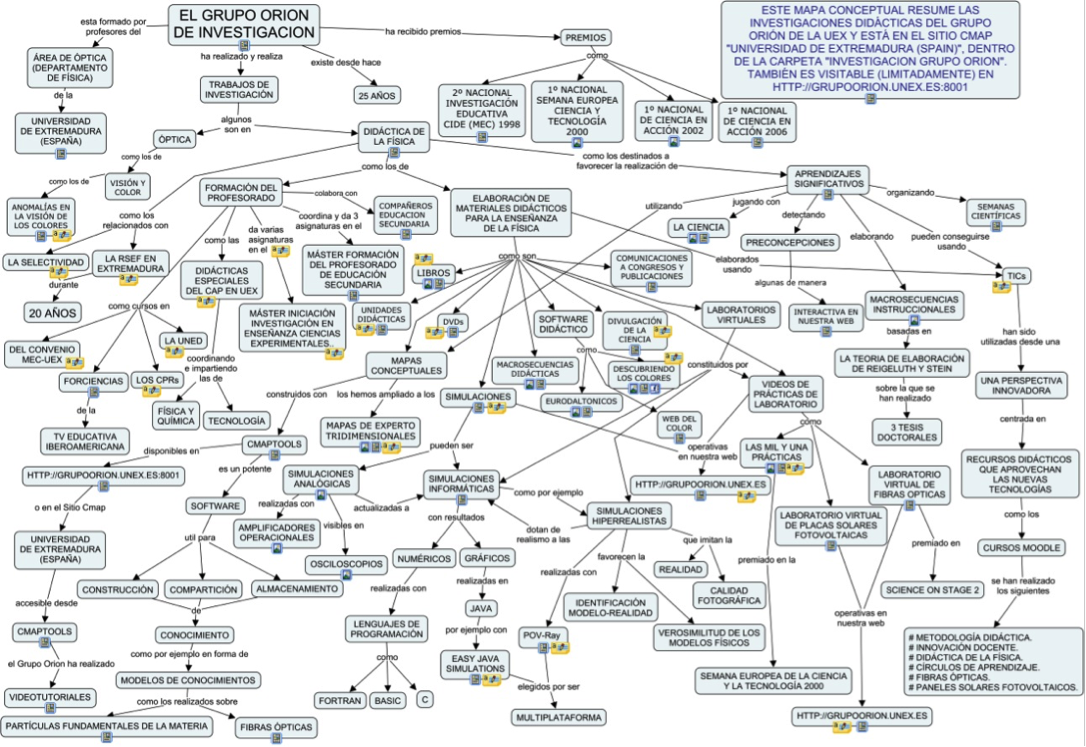
Grupo Orión de Investigación: Teaching and Research with Concept Mapping for 25 years
Since 1990, the Grupo Orión de Investigación at the Universidad de Extermandura, Spain, has been using concept maps in both teaching and research (both scientific and learning), and since 2004 they’ve been collecting the results at their “Universidad de Extremadura (Spain)” CmapServer. Concept maps have been used in a variety of courses, including Didactics of Physics and Physiological Optics for the undergraduate program in Physics; Optoelectronics for Electrical Engineering; Pedagogical Aptitude course for High School Teacher candidates; Doctoral courses; Technology of Scientific Communication and Documentation course for Masters in Engineering and Architecture and Masters of Science students; courses for Masters Program in High School Teaching; and courses for Masters on Research on Teaching and Learning of Experimental and Social Sciences and Mathematics. The group has prepared a large number of resources, including video tutorials on the use of CmapTools. On the research side, concept maps have been part of five doctorate thesis and many undergraduate and master’s thesis and projects. Current research is aimed at extrapolating concept maps to procedure maps, and more so, to reasoning models. Work on this effort is available at their CmapServer.
For more information: Grupo Orión de Investigación, Universidad de Extremadura, Spain
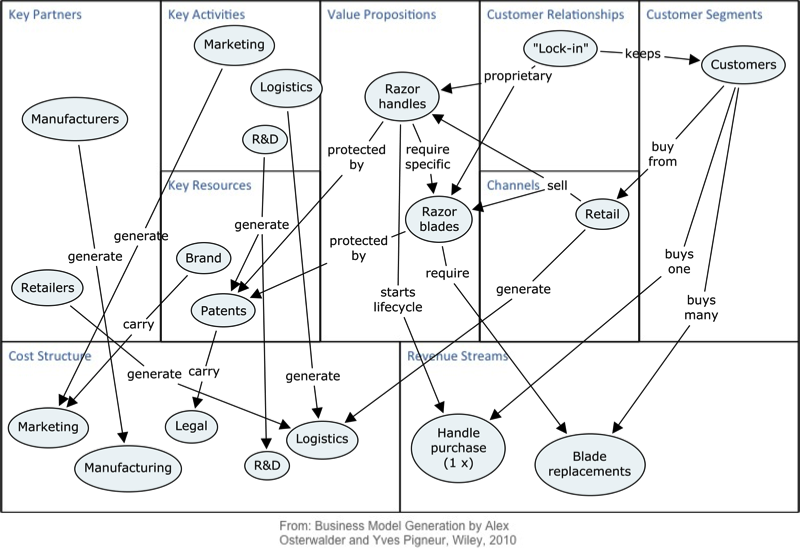
Design Thinking Business Analysis: Business Concept Mapping Applied
Thomas Frisendal, an experienced consultant for more than 30 years on the IT vendor side and as an independent consultant, promotes a new approach to information-driven business analysis based on a combination of design thinking principles and concept mapping. It is business-friendly: intuitive, easy to work with, highly communicative and visual.
For Frisendal, Concept mapping has proven to be highly successful in business analysis. Conceptual modeling (UML, Entity-Relationship diagrams etc.) failed as a business-side tool, but concept mapping – coming from educational psychology – is readily accepted in the business communities. Contrary to common wisdom business analysis is not “just a documentation issue”. It is a learning process – both for the analyst, but also for the business itself. Concept mapping works in this context because it is based on psychology (the theory of meaningful learning), rather than on an engineering mindset. Which implies that business concept mapping is a business task, as it rightfully should be.
Frisendal is the owner of BusinessConceptMapping.com, a business run by TF Informatik, a company registered in Denmark.
For more information, visit: www.businessconceptmapping.com
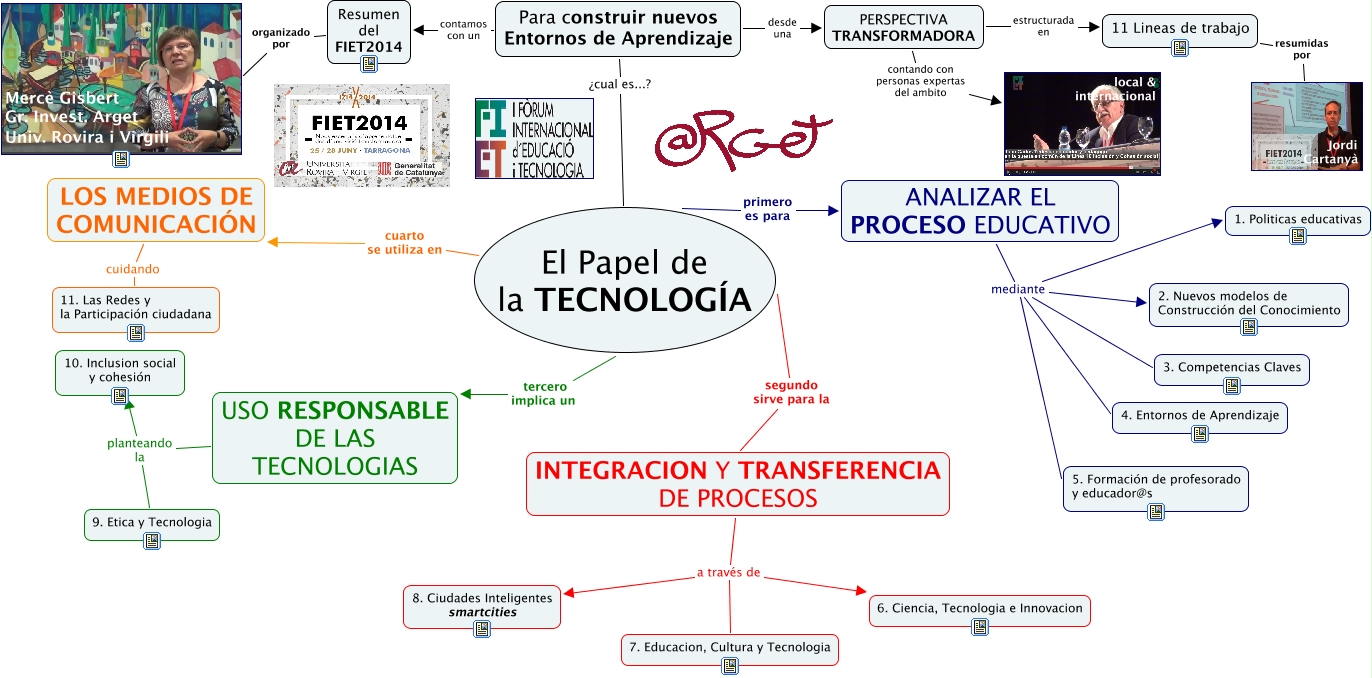
ConoCity: Ciudad del Conocimiento / ConoCity: City of Knowledge
In ConoCity, from Bilbao, Spain, Jose Sierra innovates with enriched videos to explain complex and abstract topics combining all expresive media to make the message comprehensible. The effort uses concept maps and CmapTools to organize the content. For example, the Cmap in the image, a summary of FIET 2014, is a collective work to define the role of technology by more than 200 professionals from around the world. In Tarragon, Spain, organized by the Universitat Rovira i Virgili and coordinated by the Arget research group of Mercè Gisbert Cervera, Mar Camacho and other faculty and researchers. They presented to the education community their conclusions, grouped in 11 items and interlinked in an original scheme that the concept map tries to represent. The links are to the video enterviews that summarize the work of these professionals
More information at ConoCity.
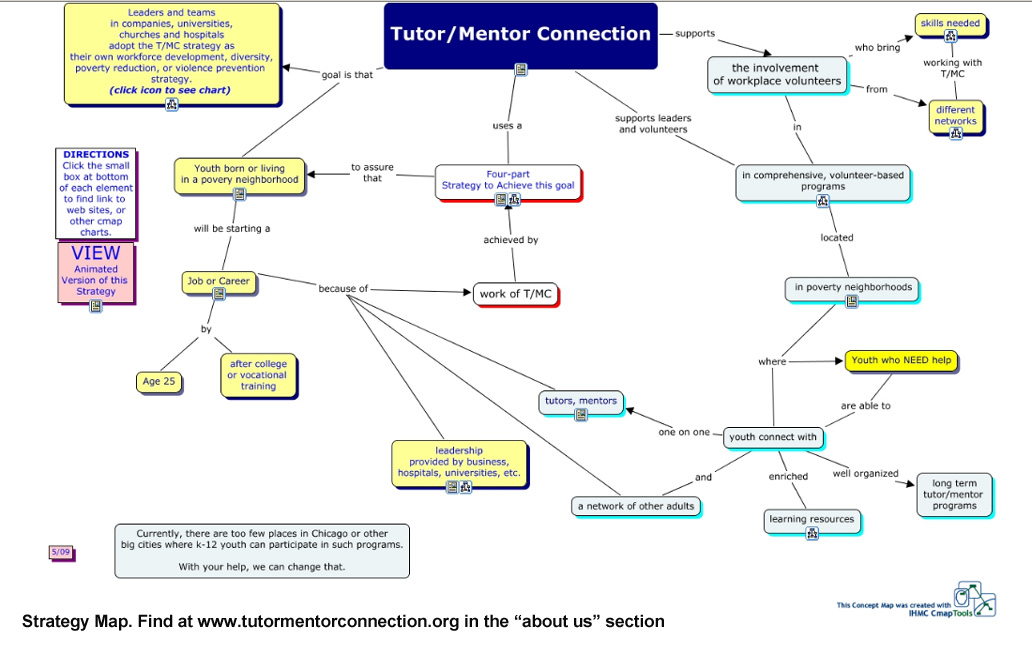
Mapping Strategies and Knowledge to Support Multi-stakeholder Involvement Youth Development Programs Located throughout Large Cities
Daniel F. Bassill, D.H.L., of Chicago, Il, USA has been using CmapTools and concept maps since 2006 to map strategies that leaders could follow to help youth born in high poverty areas move through school and into jobs and careers, and to map the information he has aggregated on Tutor/Mentor Connection and Tutor/Mentor Institute, LLC web sites since 1998.
Dan’s goal is that leaders from many sectors create versions of his strategy Cmap, with their own photo at the top, to show their own commitment to this strategy. Information collected is shared in many ways and is intended to be used by groups of people to support their own efforts to help youth in their communities, as is shown on this Cmap.
Dan seeks partners in institutions who will not only help update and improve the maps, but who will use other tools to help communicate the ideas so that they are used by leaders in many places.
Dan posts links to these maps from each of this web sites, such as www.tutormentorexchange.net.
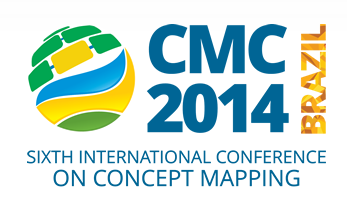
CMC: Concept Mapping Conference brings Together Cmappers from all over the World
Every two years, Cmappers from all over the world meet at CMC, the Concept Mapping Conference, to share their and learn from each other. The conference has been held in Pamplona, Spain in 2004, San José, Costa Rica in 2006, in Tallinn, Estonia and Helsinki, Finland in 2008, Viña del Mar, Chile in 2010, Malta in 2012 and in Santos, Brazil in 2014. In 2016 the community will get together again Tallinn, Estonia. The Conference Proceedings are available on line in PDF format.
Visit the CMC Website.